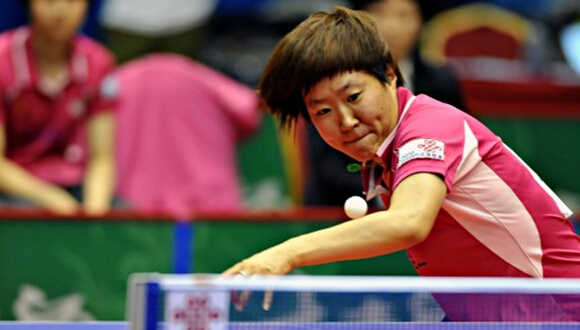A wave of business creation is sweeping across China and the buzzword "maker" is being used to describe those enterprising individuals that take the plunge. For retired athletes, seeking a new career path is inevitable. Whatever their choice is, for them, the second half of the game of life has just begun.
A month ago, former table tennis world champion Guo Yan, 32, started her Young Shine Table Tennis Club, at the Longtan Lake Stadium in Beijing.
"I like the words 'business startup.' As young people, we need to strive and fight [for a cause]," she said.
To nurture and turn out players like Ding Ning and Ma Long who have won honors for the country is "my dream," she added.
Careful Thought
Guo started to play ping pong at the age of 6 and joined the National Table Tennis Team in 1998. She has won many world champion titles in her professional career including two Asian Cup championships and two Women's Table Tennis World Cups. After retirement in 2014, she began to coach the local Beijing team.
After careful thought, she decided to open her own club. "I thought about it before retirement. The decision is not out of impulse or the persuasion of friends," she said.
Before retirement, she was the captain of the National Table Tennis Team and got on well with her teammates. She was joined by her former teammates Zhou Fangfang and Wang Xuan in setting up the club. Currently, Zhou serves as the head coach of the club and arranges the daily training schedules. Guo stays at the club two or three day per week and is responsible for the classes that improve teenagers and youths' skills.
Positioning
The club has attracted a lot of fans. In a month after its opening, it has recruited over 30 members, mostly youngsters and teenagers.
"My initial plan was to popularize table tennis among the average sports fans. However, judging from the current situation, the club should aim to help those people who want to improve their skills. "
As for the future direction of the club, Guo said it will include three aspects including: training for professional teams, training for students who wish to improve their skills and cultivating the overseas market. The latter aspect is also something the National Table Tennis Team are already doing."Many people contacted me, saying that some foreigners want to have more professional training in China," said Guo, adding that this is what every table tennis player should do to promote the sport around the world.
She is preparing for a summer camp in Changxindian, Fengtai District, to provide accommodation and closed training for people want to learn skills systematically.
Exploring New Training Models
Having received professional training from a young ages, Guo does not want to replicate her own growth path at the club.
"We are trying different ways of turning out players to see whether we can make some breakthroughs," she said. Given the career of athletes is an occupation for youths, we need long-term vision and a more liberal mind, she added.
Having her own club means she could put her thoughts and values into practice, one of which is diversifying the training models.
"Not only my team, but many people in the field are looking forward to new breakthroughs in training," she said.
"I hope every kid that comes here can be happy and have a good performance," she said.
Despite the continuous brilliant performance of the national team, there have been some bottlenecks in the development of table tennis, one of which is reduced public attention. Guo wishes she could do something to attract more children into the sports.
"I like the sport, but my regret is that I've never been to the Olympics. I will take it as a motivation for my job now as a coach," she said.
Not an Easy Game
"Opening a club is not as easy as I thought before", said Guo at a recent interview with Beijing News.
During the establishment of the new business, the Beijing team and the Longtan Lake Stadium have given great support to her. Despite that, she has invested 150,000 yuan (US$ 24,000) in the project and is expected to add more.
Compared with funding, the transformation of roles poses greater challenge. In the short span of a year, Guo has transformed from a player to a coach and a founder of a club.
"There is no problem for me in coaching. The challenge lies in the management of the club, in which I am a fresh hand," she said.
"There is so much to do, from the moment you wake until the time you fall asleep," and even during the sleep, she has to leave the mobile phone on.
Apart from the club, Guo also accompanies the Beijing Women's Table Tennis Team in matches. "It is tiring, but worth it. And I'm happy about it," she says.
Precedents
The stories of athletes starting up their business careers abound in China. Li Ning, the former gymnast and 106-time gold medalist, established the brand in his name after retirement in 1988, a trailblazing event for business creation by a sportsman. He is currently the chairperson of the Li-Ning Company Limited.
Gold medalist of the women's 10 meter synchronized diving platform at the 2004 Summer Olympics, Lao Lishi, resigned from an official post in Youth League in south China's Guangdong Province and opened her online shop in 2014. She was one of the eight people that rang the bell for the debut of Alibaba Group in the New York Exchange as a seller on the Group's online e-commerce website Taobao.com.
Short track speed skater Wang Meng, four-time Winter Olympics champion, announced the establishment of a sports product company in June 2014, with a total investment of 80 million yuan (US$ 13 million). She is the first Chinese athlete on active duty to open a business.
